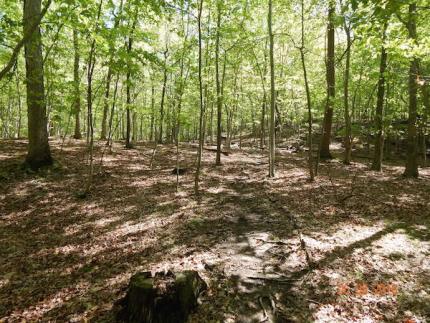
In an old story, it takes Christ three days to let go of all that holds him to this world, including the breath of life, and journey to the underworld. There he “harrows” the darkness and the depths, as an ancient farmer might probe and stir and prod the soil for planting. Then on the third day he stands next to Mary in the dawn twilight so utterly changed that she doesn’t recognize him, her dearest, most intimate friend. It is Easter, the fire feast of the Resurrection, when Christians hold services at dawn and look to the rising sun in the East while the Earth turns green again and flowers. Thus the holy, uncontrollable alchemy of descent and inception, release and grace, death and transformation, is celebrated.
We didn’t commemorate any of this at Rolling Ridge this year: no Friday “Journey of the Heart,” no Easter Fire. Nevertheless it took the forest precisely three days to journey from bare, spare branches to luminescent, luscious, abundant golden green foliage.
We in the residential community had our own burst of alchemical change. In a day of intense labor for the entire community and some friends, two families swapped houses, including all furniture and contents. It stirred things up wildly and particularly for four adults, one baby, a dog and a cat, and sent out a rippling tide of change and adjustment that engulfed everyone. There is something about changing place, changing home, changing neighbors, that is primal.
Mary Oliver writes,
“to live in this world
you must be able
to do three things:
to love what is mortal;
to hold it
against your bones knowing
your own life depends on it;
and, when the time comes to let it go,
to let it go”
Changing places and spaces requires contemplating what is taken along and what is not. One might not consider the worn wooden high chair that held many a wriggly child or the rounded black recliner where the teenagers flopped to be mortal, exactly; nor the set of etched pink glass dishes—who would use them now, really—nor the long-unopened books redolent of a certain phase of one’s spiritual development; nor the corner of the room, there, where the toddlers would “hide”; nor the way the light falls over the kitchen counter when the sun sets orange and coral through the window—but these things are loved nevertheless.
My window frames another view now. The wide bank slopes past the log smoke house down to Deer Spring Creek. Midway a grand old willow is rooted down, its once lofty branches long gone. The gnarled, barreled trunk still stands tall, wearing its jagged remnants like a crown. There, nestled in the broken tree’s resilient, stalwart core vibrant green shoots sprout; slender, graceful promises in the midst of a turbulent time that the world is always ending and beginning again.